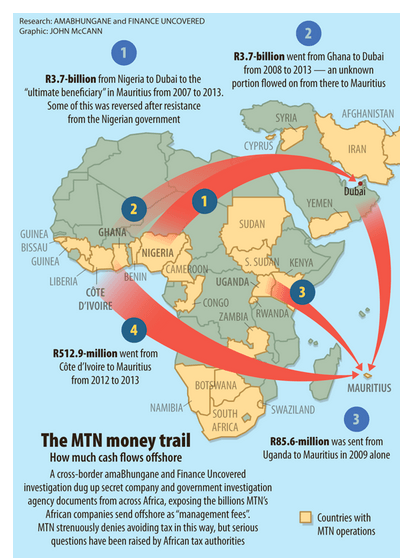 It has emerged that the telecommunications giant MTN has transferred large sums of money out of Uganda, Cote d’ivoire, South Africa and Ghana into tax havens.
It has emerged that the telecommunications giant MTN has transferred large sums of money out of Uganda, Cote d’ivoire, South Africa and Ghana into tax havens.
Although these transfers are badged as payments for management and technical services, in reality much of them end up in a shell company in the tiny Indian Ocean island of Mauritius, where MTN employs no staff.
These fees are counted as a cost of doing business and deducted from taxable profits in the countries where MTN operates outside of South Africa, but questions have been asked about whether these payments are justified.
Payments frozen in Ghana
Investigations by a team of African journalists working with Finance Uncovered, a London based reporting project have found that, in Ghana, MTN’s management fee agreement with the Ghana Investment Promotion Centre (GIPC) expired last year, and the company is battling to renew it, so for now, the offshore payments have been frozen.
Asked to explain, GIPC chief executive, Mawuena Trebarh said, while MTN had applied for permission last year, this was not approved “due to its non compliance” with Ghanaian laws and regulations.
She said this was not a “dispute” but that a second application was being reviewed.
MTN said it “is in the process of agreeing factual and legal aspect with GIPC in anticipation of resolving.”
Our investigation has also discovered that Trebarh worked for MTN as the person responsible for government relations and reputation management until 2011. We asked Ms Trebarh about her role in MTN’s negotiation with the GIPC, and whether there was a conflict of interest given her previous role at MTN Ghana. She has not responded to our questions.
MTN Ghana under scrutiny
Documents passed to us appear to show that MTN’s management fee payments from Ghana have attracted the attention of intelligence officials in Ghana.
According to our sources, an investigation of suspected economic fraud in various economic sectors was undertaken in 2012 and completed in 2013 by Ghana’s intelligence services. MTN’s management fees were considered as part of that investigation.
The documents we have purport to reflect “extracts” from MTN Ghana’s accounts, alleging that Scancom paid GH¢758 million in management and technical fees to MTN Dubai between 2008 and 2013. We have calculated this to be 9.64 percent of the company’s revenue over that time.
When asked about these fees MTN confirmed that some of the fees paid by MTN Ghana to Dubai were then sent onto Mauritius.

The intelligence officials called for a “review of all technology transfer and management service agreements currently held by GIPC to remove sections which are inapplicable and wrongly provided for” and upgrading and training of state systems and staff.
When we asked MTN about the investigation, they told us that they were aware of the investigation but that no findings had been made against them.
They insisted that despite the fees ending up in Mauritius, South African companies were properly remunerated for management services. When we asked why then were the fees paid to Mauritius, the company could not answer.
After further questions were put to them they admitted that not all management fees were passed on, some stayed in Mauritius where the company employs no staff. MTN’s own documents state that the money pooled in Mauritius is needed to repay international lenders and dividends, and are not used to pay for management services .
MTN stressed that they were not engaging in tax avoidance and that MTNI in Mauritius had always been tax resident in South Africa so the company received no tax benefit from the Mauritius structure.
The company said: “MTN has acted in full compliance with the law, in all the jurisdictions that it operates in, and that MTN has not actively engaged in any unlawful activities.”
According to our investigations, MTN’s Nigerian, Ugandan, Ghanaian and other African operations have paid billions of South African rand (ZAR) as “management fees” to MTN’s offshore tax-haven structures.
The practice of paying management fees is of increasing concern to African tax inspectors. According to Kennedy Onyoni, a spokesperson for the African Tax Administration Forum (ATAF), a group of African government tax collectors that includes South Africa, Nigeria, Ghana and Uganda: “Most international tax avoidance is not illegal but takes advantages of structural weaknesses in both domestic tax rules and international rules.”
Without commenting specifically on MTN, Onyoni said this “base erosion and profit shifting” — the technical term to describe the way in which avoidance reduces governments’ ability to collect tax — is a problem because the taxing of multinationals’ profits often accounts for a significant portion of African states’ tax bases.
He said alongside extractive and finance companies, telecommunications multinationals were among the top offenders in Africa, and described problematic offshore schemes much like those employed by MTN.
Our investigation comes at a pivotal moment for multinational businesses like MTN. G20 leaders, stung by revelations of the tax avoidance strategies deployed by US digital giants such as Apple, Google and Microsoft, commissioned the OECD to develop new rules aiming to close down loopholes used by international businesses. The proposals from the OECD were published this week and signed off by Finance Ministers of the G20 on Thursday.
At stake are hundreds of millions in lost income for governments around the world.
As policymakers start work on implementing new international tax protocols, there is a growing awareness in Africa that opportunities to make vital investments in schools, hospitals and infrastructure have been significantly compromised as big businesses, often legally, use the international tax system to, filter their profits through Mauritius and other tax havens.
By Francis Kokutse
Additional reporting:
Emmanuel Mayah (Nigeria), Jeff Mbanga (Uganda), Craig Mckune (South Africa), George Turner (UK) and Nick Mathiason (UK) contributed to this joint investigation.
Finance Uncovered is a global reporting project involving journalists in 54 countries: www.financeuncovered.org
